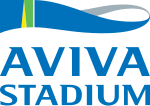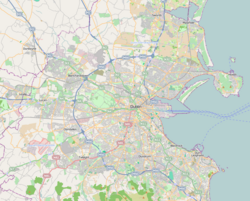
Back ملعب أفيفا Arabic Stadion Aviva BAN Авива Стейдиъм Bulgarian Aviva Stadium Catalan Aviva Stadium Czech Stadiwm Aviva CY Aviva Stadium Danish Aviva Stadium German Aviva Stadium Greek Estadio Aviva Spanish
 | |
 | |
| Former names | • Lansdowne Road • Dublin Arena |
|---|---|
| Location | 62 Lansdowne Road Dublin 4 D04 K5F9 Ireland |
| Coordinates | 53°20′7″N 6°13′42″W / 53.33528°N 6.22833°W |
| Public transit | Lansdowne Road |
| Owner | • Irish Rugby Football Union • Football Association of Ireland |
| Operator | New Stadium Ltd[1] |
| Capacity | • 51,711 (rugby union, association football)[2] • 49,000 (American football)[3][4] • 65,000 (concerts) |
| Field size | 106 m × 68 m (348 ft × 223 ft) |
| Surface | English Ryegrass |
| Construction | |
| Broke ground | March 2007 |
| Built | 2007–2010 |
| Opened | 14 May 2010 |
| Construction cost | €410 million (including €191 million of government funding, 2010)[5] |
| Architect | • Populous (formerly HOK Sport)[6] • Scott Tallon Walker[7] |
| Builder | Sisk Group[8] |
| Structural engineer | Buro Happold |
| Services engineer | ME Engineers |
| Tenants | |
| Ireland national rugby union team (2010–present) Republic of Ireland national football team (2010–present) Leinster Rugby (2010–present) Lansdowne Football Club (2010–present) | |
| Website | |
| www | |
Aviva Stadium, also known as Lansdowne Road (Irish: Bóthar Lansdún, IPA: [ˈbˠoːhəɾˠ ˈl̪ˠan̪ˠsˠd̪ˠuːnˠ]) or Dublin Arena (during UEFA competitions), is a sports stadium located in Dublin, Ireland, with a capacity for 51,711 spectators (all seated).[9] It is built on the site of the former Lansdowne Road Stadium, which was demolished in 2007, and replaced it as home to its chief tenants: the Irish rugby union team and the Republic of Ireland football team. The decision to redevelop the stadium came after plans for both Stadium Ireland and Eircom Park fell through. Aviva Group Ireland signed a 10-year deal for the naming rights in 2009,[10] and subsequently extended the arrangement until 2025.[11]
The stadium, located beside Lansdowne Road railway station, officially opened on 14 May 2010. The stadium is Ireland's first, and only, UEFA Category 4 Stadium, and hosted the 2011 UEFA Europa League final and the 2024 UEFA Europa League final. It also hosted the 2011 Nations Cup, as well as the regular home fixtures of the national rugby team, national football team and some home fixtures for Leinster Rugby and Lansdowne Football Club from 2010 onwards.
Unlike its predecessor, which was solely owned by the Irish Rugby Football Union (IRFU), the current stadium is controlled by the IRFU and the Football Association of Ireland (FAI) through a 50:50 joint venture known as the Lansdowne Road Stadium Development Company (LRSDC). The joint venture has a 60-year lease on the stadium;[12] on expiry the stadium will return to the exclusive ownership of the IRFU.[13]
- ^ "FAI can steer clear of Aviva turbulence". Irish Independent. Archived from the original on 17 February 2013. Retrieved 23 November 2014.
- ^ "Stadium Info". Aviva Stadium. Retrieved 25 November 2012.
- ^ "Final touches at Aviva for the American revolution". Irish Independent. Archived from the original on 17 February 2013. Retrieved 24 November 2014.
- ^ "Notre Dame Fighting Irish vs. Navy Midshipmen – September 01, 2012". ESPN. Archived from the original on 15 June 2018. Retrieved 24 October 2016.
Game Information: ... Attendance: 48,820
- ^ Stadium FactsIrish Times, 5 May 2010 (subscription required) Archived 21 October 2012 at the Wayback Machine
- ^ "Aviva Stadium". Populous.com. Retrieved 24 November 2014.
- ^ "Scott Tallon Walker : Aviva Stadium". Stwararchitects.com. Archived from the original on 23 June 2019. Retrieved 24 November 2014.
- ^ "Sisk lands Lansdowne Road contract". Irish Examiner. 28 November 2007. Retrieved 3 July 2020.
- ^ "Aviva Stadium Homepage". Retrieved 26 January 2023.
- ^ Gallagher, Paul (2 February 2009). "Lansdowne to be renamed Aviva Stadium". The Irish Times. Archived from the original on 8 October 2012. Retrieved 19 February 2010.
- ^ "Bumper crowds help Aviva Stadium record €4.9m operating profit". breakingnews.ie. 9 June 2022. Retrieved 10 October 2023.
- ^ [1] Archived 18 September 2010 at the Wayback Machine
- ^ Hogan, Vincent (19 April 2010). "Vincent Hogan: Aviva – the most expensive second home in history". Irish Independent. Archived from the original on 17 November 2019. Retrieved 24 November 2014.
